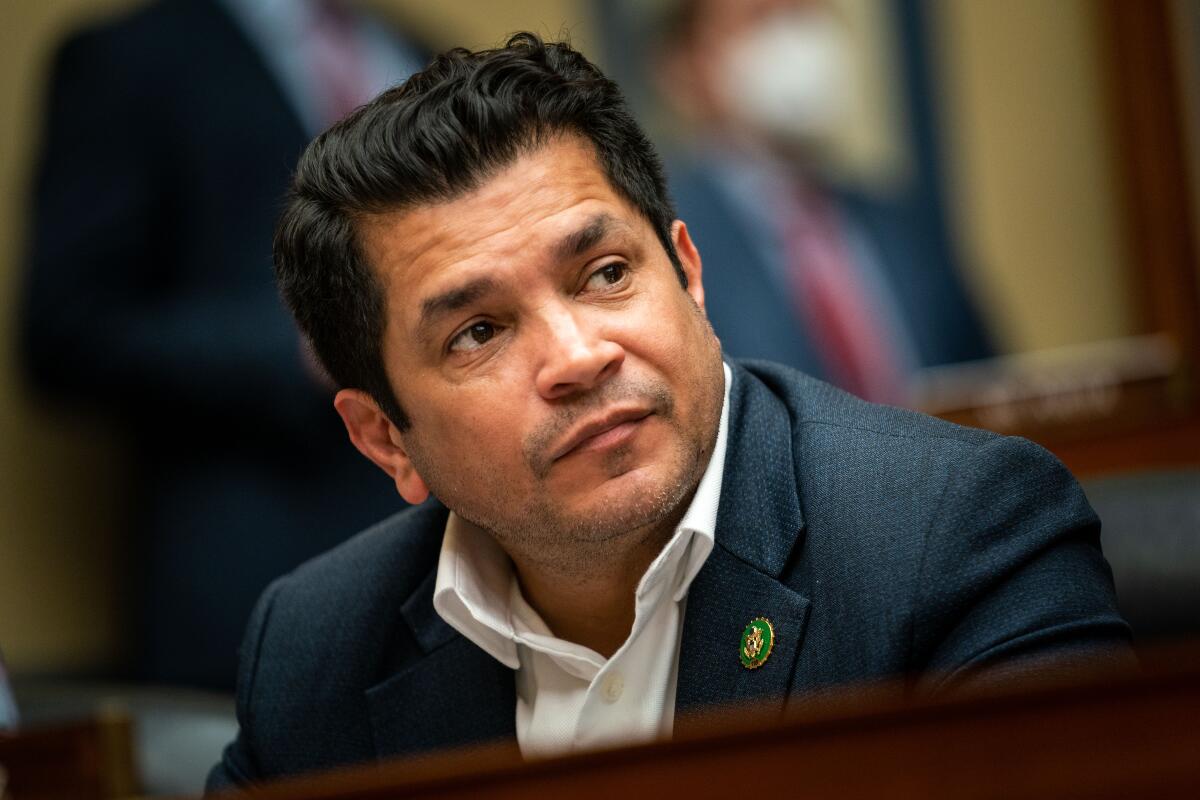
Democratic members of California’s congressional delegation, increasingly concerned about the ongoing strikes in Hollywood, are warning studios that they are watching.
Hollywood ground to a halt after negotiations between studios and the guilds representing writers and then actors collapsed earlier this summer. Thousands of workers are protesting on picket lines, demanding more money and better working conditions.
“As thousands of our constituents engage in their legally and constitutionally protected capacity to participate in a work stoppage, we urge all parties to respect and affirm collective bargaining rights as these employees negotiate with their employers,” 37 Democratic lawmakers wrote in a letter sent Tuesday to the presidents of Screen Actors Guild-American Federation of Television and Radio Artists — known as SAG-AFTRA — and the Alliance of Motion Picture and Television Producers, which represents Hollywood studios and streaming services.
“The contributions of these artists are indispensable to productions that millions of Americans watch each year to be entertained, expand their horizons, and experience unrivaled performance talent,” wrote the lawmakers, including Judy Chu of Monterey Park, Ro Khanna of Fremont, Ted Lieu of Torrance, Pete Aguilar of Redlands and Jimmy Gomez of Los Angeles.
Barbara Lee of Oakland, Katie Porter of Irvine and Adam B. Schiff of Burbank, the three House Democrats vying for the U.S. Senate seat held by Dianne Feinstein, all signed the letter. Reps. Josh Harder of Tracy, Jim Costa of Fresno, and former House Speaker Nancy Pelosi of San Francisco are the only three California House Democrats who did not join the letter.
Gomez, who organized the letter, told The Times in a phone interview that he has more than 33,000 SAG- AFTRA members living in his district and that their strike is having a ripple effect on the economy. Still, a strike is not something unions do lightly, he said.
Striking is “the option of last resort” and comes “when an employer is not negotiating in good faith,” he said.
“We’ll be supporting the right of these workers to go on strike and use their right to collectively bargain,” he said. “But we want everybody to go to the table and we want the studios to take the workers’ demands seriously.”
Gomez said he has been increasingly wary of studios’ labor tactics.
The studios’ “endgame is to allow things to drag on until union members start losing their apartments and losing their house,” an anonymous studio executive told Deadline earlier this month. The Alliance of Motion Picture and Television Producers has said that such anonymous people “are not speaking on behalf of the AMPTP or member companies, who are committed to reaching a deal and getting our industry back to work.”
Last week, NBCUniversal trimmed trees that had provided shade for workers picketing during a heat wave outside its studios. (L.A. City Controller Kenneth Mejia said his office is investigating the matter. NBC said it did not intend to create challenges for picketers and the trimming was part of annual maintenance.)
Tactics such as these have a “reverse effect” on workers, Gomez said. “It actually forces workers to become more cohesive and united, because they feel that they’re under attack,” he said.
This letter is meant to “demonstrate to the studios that Congress is watching,” he said. “We are paying attention to what they say and how they behave.”
The letter, sent Tuesday to Fran Drescher, president of SAG-AFTRA, and Carol Lombardini, president of the AMPTP, highlighted the role that artificial intelligence has played as a bargaining issue in the talks.
The lawmakers said they “understand that union members have expressed the importance of agreement on the reproduction and use of their likenesses and work product in a rapidly changing digital economy with emerging technologies that are not yet fully understood or regulated.”
The actors union has called AI a “real and immediate threat” and said it wants to guard against misuse by requiring studios to obtain consent and to compensate actors for the use of their likenesses or voices. The AMPTP has said it offered a variety of protections for workers related to the technology, including that the studios would be prohibited from using “‘digital replicas’ of background actors in lieu of hiring the required number of covered background actors.”
Still, Gomez likened the studios’ proposal for the use of AI to “wage theft,” saying that it “undermines the ability for [background actors] to get work.”
Representatives for SAG-AFTRA did not respond to a request for comment.
Gomez said that though striking is often union workers’ “ultimate leverage” during negotiations, it can also have an adverse effect on California’s economy. Gomez does not lay blame on the union for the strike, saying that it happens when a “corporation refuses to listen to what the demands of the workers are.”
Still, Gomez said that he hopes the strike does not last too long.
“Strikes are a means to an end,” he said. “Their end is trying to get a good and fair contract for the workers.”